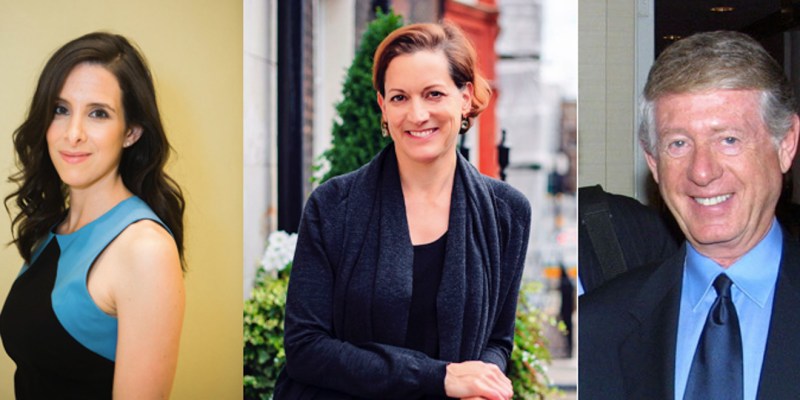A place where individuals can “live in an alternate reality” and a “weapon of mass destruction” were among the ways in which Anne Applebaum, Ted Koppel, and Jessica Lessin described the internet’s role in the changing landscape of journalism at Monday evening’s installation of Cardinal Conversations, a recently-launched speaker series intended to engage speakers from both sides of the aisle in open political discourse.
Moderated by Michael McFaul, director of the Freeman Spogli Institute and a co-organizer of Cardinal Conversations, the third event of the series highlighted the propagation of disinformation in today’s technological and political climate.
“There has been a democratization of the process of journalism,” said Koppel, best known for his role as the anchor of the television program “Nightline.” “Previously, if you didn’t work for a national news organization, you didn’t have an outlet.”
Today, however, Koppel asserted that the internet allows anyone – regardless of their journalism experience – to share their content with the world, which he said allows for the conflation of fact and fiction.
Applebaum—the Pulitzer-prize winning author of “Gulag: A History”—said she believes the distinction between so-called “fake” and “real” news isn’t as black and white at the terms used to describe them appear.
“Disinformation and fake news have categories,” she said, listing fake identities, fake audiences and fake stories as examples. “All of these things can be used at different times to create false senses of reality.”
The three speakers also discussed how so-called “fake news” rests on the increasingly blurry line between news and opinion and entertainment, as well as the pressure placed on journalists in nascent news organizations to produce “clickbait,” since their pay rests on the readership of their articles.
Lessin, founder of the technology media company The Information, is a strong believer in the subscription-based business model for funding news, which The Information employs.
“In [the subscriber model,] journalists will be thinking, ‘How can I get max subscribers to read this?’” Lessin said, arguing that the model reinforces the quality of the content produced.
Koppel expressed how the immediacy of the internet can also increase the presence of journalistic inaccuracies due to increasingly tight deadlines placed on reporters.
“The notion that if we had this perfect news organization, […] that everything that got on the air would be accurate information — that’s never going to happen,” he said.
The focus of the conversation then shifted to the erosion of readers’ trust as an result of the spread of disinformation and how President Trump’s frequent accusations of the media’s production of fake news contribute to this decrease.
“[Trump’s] game is to literally make it impossible to know what the truth is,” Applebaum said. “If you continue putting out dozens of stories and you continue undermining and reversing what you say, eventually people say, ‘You can’t know what’s true; everyone’s lying.’”
Because of this, Applebaum argues that media organizations face a greater pressure today to rigorously fact-check their content.
“The difficulty the media has with Trump is the need to constantly take account for the many ways in which he’s breaking rules, or breaking the Constitution, or telling lies,” she said.
Koppel, however, argued that the media should not get roped into a “game” of constantly fighting against Trump’s accusations.
“The media has to be absolutely crystal-clear that it is engaged in objective reporting,” he said. “The game is to induce the press into that kind of back and forth.”
The speakers also expressed their concern over some media organizations’ monetary benefit from the proliferation of both real and fake news about the Trump administration.
“[News organizations] are treating the president as a commodity that sells,” Koppel said. “And because it sells, they pound away on the subject day after day.”
Koppel also stressed how consumer influence on the content news organizations produce is “warping journalism in providing an echo of prejudices people already carry” rather than providing an “echo of reality.”
Lessin, however, said she believes the media can’t rely on what she described as Koppel’s “eat your vegetables” approach, and needs to remember the importance of making content marketable.
Both Koppel and Lessin agreed that major news organizations should focus on continuing to produce accurate, quality content to combat fake news.
“There is such a wealth of information out there that ultimately it’s going to be quality that rises to the top,” Koppel said.
Applebaum however, said she does not believe quality will necessarily change people’s perception of the news.
“I still think the problems of what we’re going to do about the algorithms, what we’re going to do about fake identities, what we’re going to do about fake followers – all of these things are still distorting the way people see information and see the news,” Applebaum said. “Until those problems are solved, I don’t think we can relax.”
Contact Julia Ingram at jmingram ‘at’ stanford.edu.
